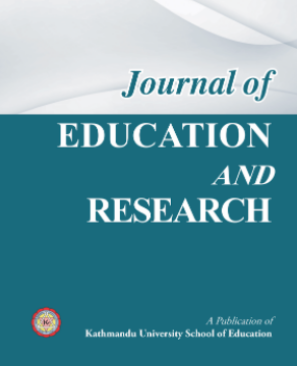
About
Focus and Scope
Journal of Education and Research (JER) is a peer-reviewed journal published biannually by School of Education, Kathmandu University, Nepal. The main purpose of the Journal is to contribute to knowledge building process on education by providing a forum for scholarly discourse on the role of education in enhancing human capabilities and well-being. For this purpose, the Journal publishes original research and other scholarly creations of academic value that contribute to human understanding of education and its processes. JER aims at sharing the knowledge, values and skills among individuals and communities with the ultimate aim of spreading knowledge. In order to achieve this aim, we promote localized analysis as well as comparative perspectives. Similarly, we welcome papers that perceive education with an integrative perspective bringing in local, national, regional as well as global contexts. We publish full-length research, opinion, and review papers as well as short-notes, reflective notes, book reviews and abstracts of student research works.
We consider education as a formative social process that contributes to building human cognition and character eventually transforming towards a just and peaceful society. This means education has both social and cognitive roles. In its social role, education provides a foundation to address the questions of the human condition, poverty, vulnerability, inequality, and exclusion and offers alternatives towards creating opportunities for a cultural everyday life compatible with nature as well as in accordance with advancements human beings have achieved. Yet, the role of education in continuing reproduction and maintaining hierarchies of opportunities cannot be denied. Likewise, as part of social role, education has also a developmental dimension - its relationship with the concerns of development and underdevelopment. We may know there are both 'clean' and 'dirty' developments and education has a share in both of these forms of development. Why and how does development take a dirty turn? On the one hand, education has a potential to contributing towards a transformative turn i.e. a clean form of development like improving access to health and education, increasing realization towards rights and identity, initiating discourses on contestations against domination, etc. On the other hand, there are environmental hazards, displaced people, crowded slums, human trafficking, etc. as vivid examples of what can be termed as dirty development. There are direct and indirect linkages between education and these dirty forms of development. A paradoxical situation of education and its social and developmental roles is thus an issue for further exploration.
In its cognitive role, education contributes to making a social individual with enhanced mental, moral and many other capabilities. These capabilities help a person acquire, use and transfer knowledge and skills, earn a living, involve in creative works, and behave and act socially and responsibly. This is the learning that enables a person to face the challenges, adjust with the context, and even change the context. Such learning goes on throughout our life - we learn while working, thinking, observing, and listening. There are, however, formal and informal activities designed particularly for learning, and there are different ideas and theories exploring how best a person learns.
All these different dimensions of education are the focus of this Journal. We promote critical discourse on all these aspects in order to build new theoretical as well as practical insights. While talking about building theoretical insights, we promote the theorization of local perspectives. In order to explain and interpret local processes and phenomena, deriving from world theories is important but more important for us is building local theories deriving from those processes and phenomena. This would allow us to see our realities and interpretations on the basis of our own world views, values, and perspectives. The meaning of local, however, could be wider. We can consider the local as a small locality/community, larger group/society, nation, region, and even at the level of the continent.
JER invites scholarly papers from all authors, including research students. We request your support in our endeavour to build and share knowledge for enhancing human capabilities and well-being.
Editor-in-Chief
Mahesh Nath Parajuli, Kathmandu University School of Education, Nepal
Managing Editor
Rebat Kumar Dhakal, School of Education, Kathmandu University, Nepal
View citation data on Google Scholar.